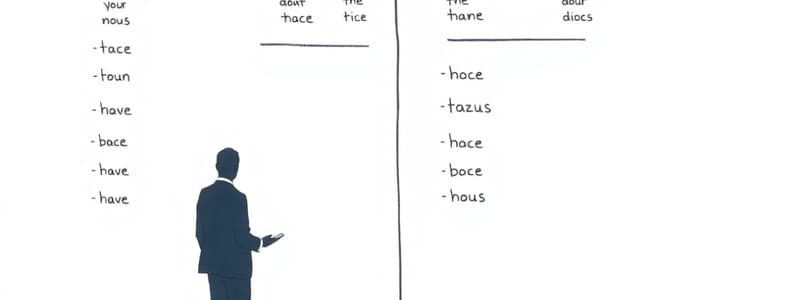Podcast
Questions and Answers
Which type of noun refers specifically to a unique entity and is always capitalized?
Which type of noun refers specifically to a unique entity and is always capitalized?
- Common Noun
- Collective Noun
- Proper Noun (correct)
- Abstract Noun
What type of pronoun is used to show that something belongs to someone?
What type of pronoun is used to show that something belongs to someone?
- Personal Pronoun
- Interrogative Pronoun
- Possessive Pronoun (correct)
- Demonstrative Pronoun
Which of the following is an example of a reflexive pronoun?
Which of the following is an example of a reflexive pronoun?
- Himself (correct)
- She
- Their
- His
Which type of sentence is designed to convey a command?
Which type of sentence is designed to convey a command?
What is the term for a noun that represents a group as a single unit?
What is the term for a noun that represents a group as a single unit?
Flashcards are hidden until you start studying
Study Notes
Noun Types
- Common Noun: General name for people, place, thing, or idea (e.g., cat, city, book, happiness)
- Proper Noun: Specific name for a person, place, or thing (e.g., John, London, Eiffel Tower)
- Collective Noun: Refers to a group of people, animals, or things as a single entity (e.g., team, flock, herd)
- Abstract Noun: Refers to concepts or ideas that cannot be physically seen or touched (e.g., love, justice, freedom)
Pronoun Types
- Personal: Refers to a specific person or thing: I, you, he, she, it, we, they
- Possessive: Shows ownership or relationship: My, your, his, her, its, our, their
- Reflexive: Refers back to the subject, emphasizing action on the subject: Myself, yourself, himself, herself, itself, ourselves, themselves
- Demonstrative: Points out a specific person or thing: This, that, these, those
- Interrogative: Used to ask questions: Who, what, where, when, why, how
- Relative: Connects a clause or phrase to a noun or pronoun, providing additional information: Who, whom, whose, which, that
- Indefinite: Refers to a non-specific person or thing: Anybody, somebody, nobody, everything, something, nothing
Parts of Speech
- Noun: Names a person, place, thing, or idea
- Pronoun: Replaces a noun
- Adjective: Describes a noun or pronoun
- Verb: Shows action or state of being
- Adverb: Modifies a verb, adjective, or another adverb
- Preposition: Shows the relationship between a noun or pronoun and another word in the sentence
- Conjunction: Joins words, phrases, or clauses
- Interjection: Expresses strong emotion
Sentence Types
- Declarative: Makes a statement and ends with a period (.)
- Interrogative: Asks a question and ends with a question mark (?)
- Imperative: Gives a command or makes a request and ends with a period(.) or an exclamation mark (!)
- Exclamatory: Expresses strong emotion and ends with an exclamation mark (!)
Studying That Suits You
Use AI to generate personalized quizzes and flashcards to suit your learning preferences.




